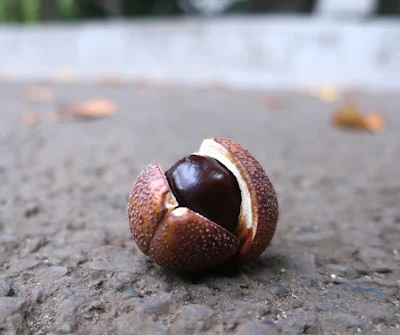I thought that they were Japanese chestnuts at first but they have no burs. They're Japanese horse chestnuts (Aesculus turbinata). Japanese horse chestnuts resemble European horse chestnuts and Japanese chestnuts very much but Japanese chestnuts open when ripe whereas the Japanese and European horse chestnuts do not. Also, while Japanese chestnuts are edible and sweet, Japanese horse chestnuts are edible but very bitter and the European ones are poisonous. You cannot mistake one for another...
 |
| Japanese horse chestnut (Aesculus turbinata) トチノキ(栃の木) |
 |
| The horse chestnut bur does not open even when ripe 熟しても栃の木の蒴果は閉じたまま |
(If you wish to post your comment but don't have a Google account, select "anonymous" from the drop down menu titled "comment as"!)
最初栗かと思ったのですがイガイガがない。栃の木の実です。いろいろ違いがあるようで、栗のイガイガ(蒴果)は熟すと開きますが、栃の木の実は、日本の栃の木も西洋トチノキ(いわゆるマロニエ)も閉じたまま。もう一つ違うのは、栗は甘いけど、栃の木の実は苦い(食べられるけど)。西洋トチノキは何と有毒です。うっかり間違えると大変そうです。
(Google アカウントを持ってない方は、コメント記入後に「Google アカウント」をクリックし、「匿名」か「名前/URL」を選択してからご記入ください!)


0 件のコメント:
コメントを投稿